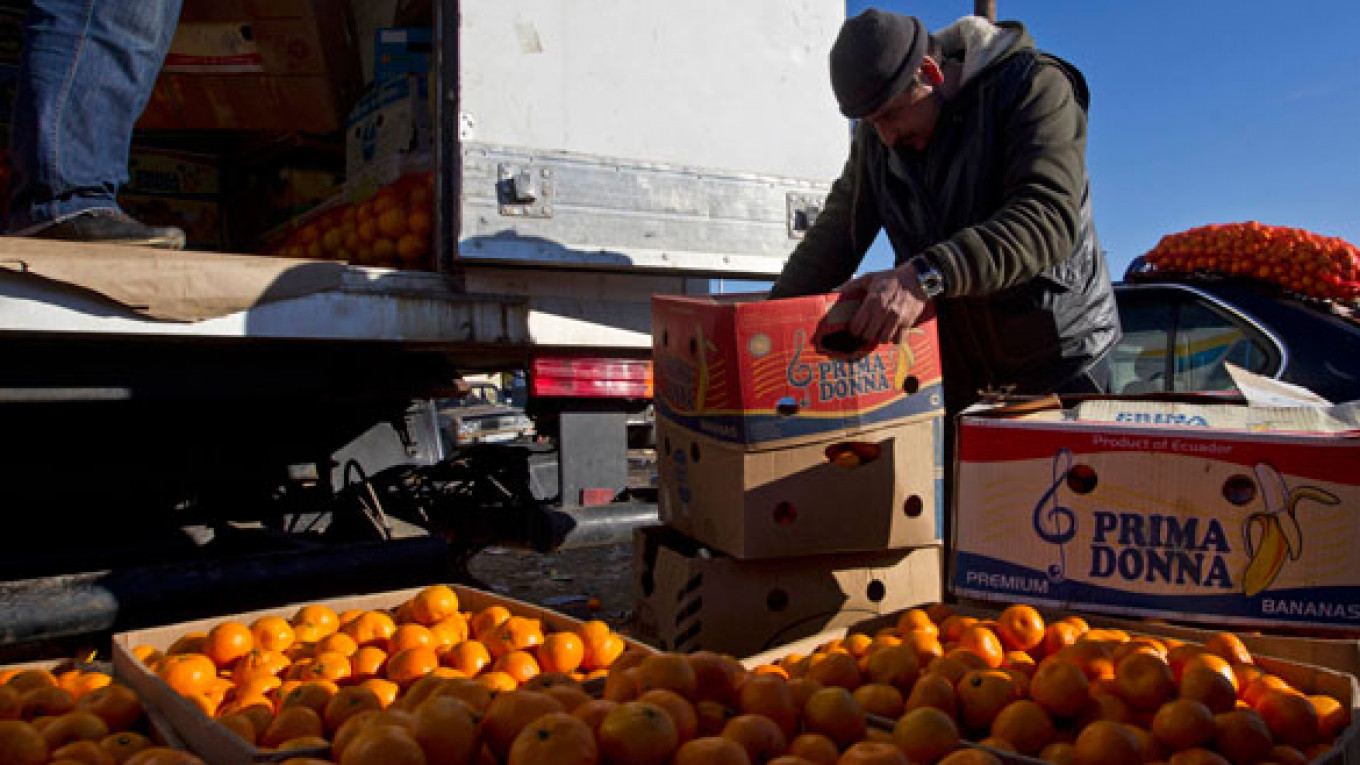A heavily patrolled security zone has been expanded in Georgia's breakaway region of Abkhazia ahead of the Winter Olympics in nearby Sochi, prompting new protests from Tbilisi that Moscow is infringing on its sovereignty.
The boundaries of the border zone have been moved temporarily from the Russian-Abkhaz border, located 10 kilometers from Sochi, to a town that is 11 kilometers deep into Abkhaz territory because of security concerns linked to the Games, which open Feb. 7, Russian and Abkhaz officials said.
People entering the zone by foot or car from Jan. 20 to March 21 are required to present identification cards.
The new entrance to the zone is a long-defunct checkpoint that has been reopened in the coastal town of Bagripsh. The post is jointly manned by officers from the Abkhaz state security service, Interior Ministry and migration service, according to the Abkhaz news agency Apsnypress.
Georgian President Giorgi Margvelashvili condemned the move, calling on Russia to observe international norms and requesting a response from the international community.
The Georgian Foreign Ministry echoed these sentiments, calling it an "illegal expansion into Georgia's territory."
"The creation of a border zone on Georgia's sovereign territory without the consent of the Georgian government is yet another infringement of territorial integrity and sovereignty," the ministry said in a statement last week.
Georgian Foreign Minister Maya Panjikidze warned that Tbilisi might raise the issue at ongoing negotiations with Abkhazia and another breakaway Georgian region, South Ossetia, in Geneva.
"If this situation continues after the Olympic Games in Sochi, we will react sharply at forthcoming Geneva talks," she said, according to local media.
In Moscow, Foreign Minister Sergei Lavrov accused Georgia of failing to recognize the realities of the region.
"We value the efforts of our Georgian neighbors to cooperate on issues relating to Olympic security in Sochi, but we very often run into the problem of Georgia not acknowledging the realities that have come about in the region," Lavrov told reporters. "This will periodically hamper and hold back our relations."
Russia is one of the few countries in the world that recognizes Abkhazia and South Ossetia as independent states.
Inal Khashig, a resident of the Abkhaz capital, Sukhumi, and editor of the local independent newspaper Chegemskaya Pravda, suggested that the Georgian side was overreacting.
"Most media sources have misconstrued the event," he said by telephone. "The border itself was not moved. My Georgian colleagues have been calling me with the assumption that the Russians brought an extra contingent of soldiers, but that is not the case."
Indeed, Russian and Abkhaz officials insist that the border itself remains where it was before over the Psou River and the only change is the temporary expansion of the border zone.
The checkpoint "is an extra filter for people that are heading toward the border," Khashig said.
Russian and Georgian relations have been strained since the two countries fought a brief war over South Ossetia and Abkhazia in August 2008. Diplomatic ties were severed, and the border was closed.
In the past year, however, both countries made markedly constructive efforts in repairing relations.
Last August, negotiations held in Prague resulted in an agreement permitting cross-border passenger and cargo road transportation.
Russia started issuing work visas to Georgian truck drivers this month, and after prolonged hesitation, Georgia announced its decision last week to send a 19-member delegation of athletes and trainers to the Olympic Games. Official government representatives, however, will not attend.
"Participation is more aimed at avoiding a deterioration in relations," a Georgian Foreign Ministry official said by phone. She asked not to be identified lest her position not reflect the official Georgian line.
"Together with refusing to boycott the Sochi Olympics, Georgia has undertaken a number of constructive steps aimed at showing that Georgia, for its part, is not interested in continued tensions with Russia," she said. "These steps included appointment of a special representative for relations with Russia, Zurab Abashidze."
Back in Abkhazia, the resurrected checkpoint was referred to as the "golden post" by locals in Soviet times because it is located on the only main road out of Abkhazia. On one side of the road lies the Black Sea and on the other loom steep cliffs.
Incidentally, the checkpoint functioned in the Soviet era as a way to control the illegal export of mandarin oranges, a much-sought-after luxury food at the time.
"In Soviet times there was a traffic police checkpoint at the same spot," said Khashig, the newspaper editor. "For some reason it used to be forbidden to transport locally grown mandarin oranges beyond the border of Abkhazia. Only small amounts were allowed, so there was a checkpoint set up to inspect automobiles during harvesting season."
Contact the author at newsreporter@imedia.ru
A Message from The Moscow Times:
Dear readers,
We are facing unprecedented challenges. Russia's Prosecutor General's Office has designated The Moscow Times as an "undesirable" organization, criminalizing our work and putting our staff at risk of prosecution. This follows our earlier unjust labeling as a "foreign agent."
These actions are direct attempts to silence independent journalism in Russia. The authorities claim our work "discredits the decisions of the Russian leadership." We see things differently: we strive to provide accurate, unbiased reporting on Russia.
We, the journalists of The Moscow Times, refuse to be silenced. But to continue our work, we need your help.
Your support, no matter how small, makes a world of difference. If you can, please support us monthly starting from just $2. It's quick to set up, and every contribution makes a significant impact.
By supporting The Moscow Times, you're defending open, independent journalism in the face of repression. Thank you for standing with us.
Remind me later.






